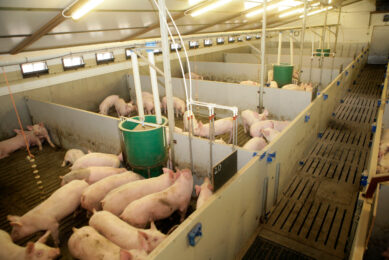Research: Genetic markers for improved pork quality
The Ontario Genomics Institute (OGI) has invested $100,000 in a University of Guelph project that involves developing genetic markers that may eventually help produce pigs without boar taint. The research has the potential to improve both productivity and animal welfare.
“This investment from OGI will enable us to take the final step in our work,” said Jim Squires, a U of G animal scientist who has been investigating which genes cause boar taint for more than 20 years along with colleague Prof. Flavio Schenkel.
After effective genetic markers for animals without the problem are identified, they may be used in commercial breeding programs to produce pig lines that are substantially free of boar taint, said Squires.
Boar taint
Boar tainted pigs that are have a very low market value compared with those that are free of taint. Currently, castration of male pigs is common practice to prevent boar taint, but the drawbacks range from animal welfare concerns to increased feed costs and reduced lean meat yield.
Identifying promising breeding lines through genomics would allow producers to sidestep these problems and improve breeding programs.
Squires and Schenkel have already discovered and validated a subset of genetic markers. The OGI investment, along with support from industry partner JSR Genetics, a United Kingdom pig breeding company, will enable the team to identify an expanded set of the most effective markers. The goal is to validate a subset that is sufficiently predictive of reduced boar taint, which could eventually lead to the development of breeding programs driven by the biomarker approach.
Eradicate the need for castration
This would result in pig breeds with low enough levels of boar taint to eradicate the need for castration. JSR Genetics is providing samples and cell lines as well as performance and pedigree data. If successful, the same approach could be used to identify, validate and apply markers for pig breeds used by Ontario and Canadian pig breeding companies.
In Ontario, hogs are a top commodity, with $815 million in market receipts in 2008. The OGI funding comes from its Pre-Commercialization Business Development Fund. “OGI is pleased to be investing in a genomics research program focused on near-term positive impact on food production, with respect to both quality of product and improvement of practice,” said Christian Burks, OGI’s president and CEO.
Related website
• University of Guelph











